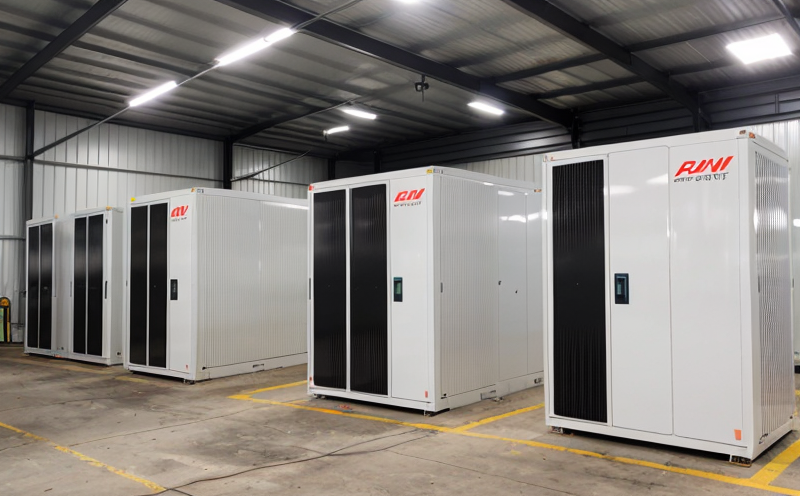ASTM E2105 Infrared Thermography Testing of Battery Packs
The ASTM E2105 standard provides a robust framework for conducting infrared thermography (IRT) on battery packs. This non-destructive testing method is widely recognized for its ability to identify thermal anomalies in complex assemblies without the need for disassembly or additional invasive procedures.
Using IRT, we can detect and quantify temperature variations within battery cells and modules. The primary purpose of this service is to ensure that batteries operate efficiently and safely under various conditions. By identifying potential hotspots early on, our team helps prevent failures that could lead to safety issues such as overheating or thermal runaway.
The ASTM E2105 standard specifies the procedures for performing IRT on battery packs using an infrared camera with a resolution of at least 320x240 pixels. The test setup typically includes a controlled environment where the battery pack is subjected to specific stress tests, including charging and discharging cycles.
Specimen preparation involves ensuring that the battery pack is fully charged before testing begins. This ensures accurate readings by minimizing any initial thermal gradients within the cells. During the actual IRT process, multiple images are captured at different stages of operation to capture temperature changes over time.
The resulting data provides detailed insights into how each cell performs under load and how efficiently heat dissipates throughout the module. This information is critical for quality assurance purposes as it allows manufacturers to identify weak spots early in production or during R&D phases.
For R&D teams, this service offers an invaluable tool for optimizing battery designs by pinpointing areas that require improvement based on real-world performance metrics rather than theoretical models alone.
In compliance departments, adherence to standards like ASTM E2105 ensures regulatory requirements are met while also enhancing product safety and reliability. For procurement personnel, knowing the quality assurance measures employed during manufacturing can help make more informed decisions about sourcing components for future projects.
Benefits
- Precise identification of thermal anomalies in battery packs;
- Non-destructive testing method that preserves the integrity of the batteries throughout the inspection process;
- Early detection of potential safety hazards like overheating or thermal runaway;
- Data-driven insights for optimizing battery design and performance;
- Compliance with industry standards such as ASTM E2105;
- Enhanced product reliability through continuous quality assurance processes.
Industry Applications
- Automotive manufacturers looking to ensure the safety and efficiency of electric vehicles;
- R&D departments within tech companies developing next-generation battery technologies;
- Regulatory bodies responsible for setting and enforcing quality standards across various sectors;
- E-commerce platforms handling large numbers of consumer goods requiring periodic inspections;
- Original Equipment Manufacturers (OEMs) seeking to improve the performance of their products.
Quality and Reliability Assurance
The ASTM E2105 standard plays a crucial role in maintaining high standards of quality within the energy and renewable energy sector. By utilizing this method, laboratories can provide reliable results that meet international specifications. This ensures products not only comply with current regulations but also exceed expectations by offering superior performance.
Our laboratory adheres strictly to ASTM E2105 guidelines when conducting IRT tests on battery packs. We employ state-of-the-art equipment and trained professionals who understand the nuances of this testing technique. The use of advanced software allows us to analyze data accurately, providing clients with comprehensive reports detailing any findings.
Through rigorous testing processes, we help maintain consistent quality across all stages of production. This is particularly important for ensuring that batteries used in critical applications such as electric vehicles or renewable energy systems meet stringent safety criteria.
By leveraging ASTM E2105 IRT technology, our clients gain peace of mind knowing their products have been thoroughly evaluated according to recognized industry standards. This commitment to excellence contributes significantly towards building trust with customers and stakeholders alike.





